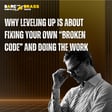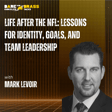Become a Creator today!Start creating today - Share your story with the world!
Start for free
00:00:00
00:00:01

LIVE from SquadCon: Future Proof Your Career with Cyber Threat Intel Techniques
Welcome to Season 3! This week we’re bringing you the live recording of our talk at SquadCon during Hack Summer Camp a few weeks back. Our talk was called, “Future Proof Your Career with Cyber Threat Intelligence Techniques.” Many thanks again to the Black Girls Hack Foundation and the SquadCon crew for having us, and to Rebekah Skeete for the killer intro!
And, we’re fast approaching episode 100 of this podcast! We’re doing an AMA with a very special guest host.
So, what do you wanna ask us?
Email your questions to bareknucklespod@gmail.com, with "AMA" in the subject line. If we air your question, you can expect some special swag your way!
Transcript
Introduction and Announcements
00:00:06
Speaker
Hey listeners, George K here. Welcome to season three of Bare Knuckles and Brass Tax. This week, we're bringing you the live recording of our talk at SquadCon during Hacker Summer Camp a few weeks back. Our talk was called, Future Proof Your Career with Cyber Threat Intelligence Techniques.
00:00:24
Speaker
Many thanks again to the Black Girls Hack Foundation and the SquadCon crew for having us, and to Rebecca Skeet for the killer intro. And one last thing, if you can believe it, we are fast approaching episode 100 of this podcast. We're going to do an AMA with a very special guest host.
00:00:42
Speaker
So what do you want to ask us? Email us your question at bareknucklespodatgmail.com. That's bareknucklespodatgmail.com with A-M-A in the subject line. If we air your question, you can expect some special swag sent your way.
Setting the Stage at SquadCon
00:01:01
Speaker
Now on with the show.
00:01:04
Speaker
I'm going to set the stage here. Get hired. Jobs. Secure the bag. More money. New tax bracket. Any of this sound good to you? Anybody want to get hired? Thank you. Thank you. I hear the chairs of the crowd, the adulation. I feel like that's for me, not just what I said. Thank you. Coming to the stage, we have some OG squad con attendees.
Advancing in Cybersecurity
00:01:28
Speaker
allies in name and in action because it's always great when people follow through and podcasts hosts of Bare Knuckles and brass tacks George K and George A. Let's go!
00:01:56
Speaker
Hello, everyone. I'm George Kay from The Vendor Side. And I'm George A, a Chief Information Security Officer. And together we are the hosts of the cybersecurity podcast Bare Knuckles and Brass Tax. And raise your hand if you are looking to advance your career in cyber, get started in cyber, worried about a layoff in cyber, or just generally are looking to kick ass in cyber.
Career Transitions and Networking
00:02:18
Speaker
Up high, up high, let's go. All right, so today we are here to talk about how to future-proof your career using cyber threat intelligence techniques. And I'll start with a little story about my own. So when I was speaking here last year, I was just coming off a layoff. I had flown out to Vegas. I had just accepted a new job offer. um I'd gotten that famous sort of like one-to-one meeting with my manager, and then I log on, and there's HR.
00:02:47
Speaker
ah That was in May. I was employee 18 at that company, so I was like ride or die for this startup. I probably thought I was invincible because I knew where all the bodies were buried. Turns out I'm a line item in a spreadsheet somewhere, so it's time to go. um And so I learned a little bit about how to advance my career and recover.
00:03:07
Speaker
Right before SquadCon last year, I accepted an offer with a 35% increase in pay, having never submitted a resume, and having never submitted an application to that job. So we're going to talk about how that happened. And then later, as it was time to move on from that company,
00:03:26
Speaker
A job posting went out. I didn't even know about it. Seven of my friends put my name out for that. Again, no resume, no application. Got my dream job. So ah we're going to talk about that story and how it incorporates here.
Future-proofing Careers with Cyber Threat Techniques
00:03:39
Speaker
but Similar to George, I went through kind of the same career transitional period about three years ago. um What I do now is very different from what I've done pretty much throughout the rest of my working life. I came from the military industrial sector. I'm ah i'm a veteran, shout out to all the veterans who are listening. um And after the military, obviously we went into cyber, the usual army to cyber pipeline that I'm sure many of you know of.
00:04:05
Speaker
I wanted a new challenge because if you're dealing with large scale organizations, you're dealing with a lot of public sector client work, it's a certain type of a cyber and generally exciting is not it. What I wanted was an opportunity to find somewhere that was heavily targeted and that I would be able to utilize my skills, I'd be put to the test and I could put my leadership skills to the test as a CISO to put a team up to to to bring it to a high performance level.
00:04:34
Speaker
I had an opportunity to work at a place that is one of the most targeted organizations in the entire internet. I work in the online dating space. I am in a post-incident organization. I am hit with more DDoSs, more ransomware campaigns, and more scammers on the trust and safety front than most people ever deal with in their career on an average weekly or monthly basis.
00:04:56
Speaker
My belief was, and I still believe it to this day, intelligence-led security is how it's done right. It is the future of how we do this thing. It is the now of how we do this thing.
00:05:10
Speaker
which brings us to. That's right. So it's the proactive approach to security, which makes sense when you talk about your proactive career del development, because truth be told, the job market right now is WAC AF. This is Matthew McConaughey stuck in the Tesseract.
00:05:26
Speaker
And I'm sure if you are out there looking at positions online, looking at titles on LinkedIn and you're trying to apply, and you see that it was posted an hour ago and 300 people have already applied, that you feel very much like you are living in the Upside Down or the Tesseract. Like, it's really hard. And I talk to CISOs every day, so from the top all the way to entry level, it's the same situation.
00:05:47
Speaker
It's weird. It's not what it was pre-COVID. It's not like you see the job and you post and you apply and you get the interview. It's nuts. So that's what we're that's what we're dealing with. But we're here today, friends, because we have a strategy. And we believe our strategy can help you the same way that it's helped us. That's right. So we are here to share what we have learned from hundreds of hours of interviews with everyone from the Black Girls Hack Squad,
00:06:15
Speaker
to CISOs, to marketers, to everyone inside that cyber ecosystem, and ah yeah, so we're gonna share what we have. Now what we've learned, and and you gotta go on a little bit of a thought exercise with us, the same way that you deal with the adversarial environment should be the same way that you strategically approach your career.
Defining Career Requirements and Networking Strategies
00:06:36
Speaker
Yeah, write that down. The job market is an adversarial landscape, and that's why we're gonna use cyber threat intel techniques to get through it.
00:06:45
Speaker
Now, here are the steps of of the threat intelligence cycle. I'm sure many of you already know it, but just to go over it, you're supposed to gather your requirements, plan your operation, conduct your collection, do your analysis, and then create and disseminate your excellent reporting. That's the cycle as it's known.
00:07:08
Speaker
So we are going to map these to different stages of the job approach that we are advocating here today. So we're going to start with defining the categories, right? Or as far as defining the requirements, I should say.
00:07:24
Speaker
And when you have to look at your requirements, you have to understand it's not just about your immediate requirements or your PIRs, your primary intelligence requirements or priority intelligence requirements. You need to look at requirements setting as a goal setting exercise in different phases. Those phases being, you know, one year from now, three years from now, five years from now.
00:07:44
Speaker
similar to how you would approach your career, you have to understand when you want to build a program and you want to build an operation, there's what you're capable of doing today and then planning for the maturity that you're going to try to implement tomorrow. That's right. so In marketing speak, are you a passive character in your own story, or are you gonna bring that main character energy to your career development? So this is the job search of yesteryear, where you look for the postings, you look for, whether it's on LinkedIn, this is how you look for the hiring manager, this is what you apply to, no. Everyone in this room is becoming Captain Marvel after today.
00:08:25
Speaker
Now you have to look at planning. yeah the plan You how you're going to do this operation. You have to plan how you're actually going to find your resources to actually conduct it. So if you are a part of a robust team, you'll have a robust threat intelligence capability with people who have different skills. Maybe you have folks who are more the pen tester type who can understand things at a code layer,
00:08:51
Speaker
or you have folks who have linguistic experience who can actually apply those languages to the language of your attackers, since cyber is a global game. But how you plan that operation, that's going to determine success and your ability to produce good intelligence information out of the research that you conduct.
00:09:12
Speaker
And this is how you're gonna plan your job search. You're gonna go look at that market analysis. You're gonna look, what are the roles that you are considering? Are there common themes inside of those roles instead of role by role, right? I think, again, yesterday you saw the position. You try to tweak and retool your resume and your approach for that job, then you do it for that job, that job.
Cultivating a Network and Advisory Board
00:09:32
Speaker
No, you need to look at it as a whole spectrum. What are the patterns in there? What are commonalities? Do you fit those commonalities? And then, second layer,
00:09:41
Speaker
What are uncommon things that you can bring to those roles that are going to to redefine and highlight your skill set against them? So here we have define your what and your why. So what is your career plan? What is your development plan? But why are you doing that? And also, once you start looking at those patterns, you're going to consider planning who you need to connect with. So if it's like your plan is offensive team lead or red team lead, but you don't actually know any red teamers and you sort of all have entry-level pen testers in your network, now you are planning who you need to start reaching out to, who you need to start meeting at local meetups or conferences, like you're developing that plan. So that's that proactive approach.
00:10:24
Speaker
Now you have to talk about collection. How are you going to acquire the raw information that you're gonna turn into actionable intelligence? Now, there are different sources. And and in cyber, just like in all source, there is a ton of different avenues that you can go to. There's threat feeds, there's RSS feeds, there's the blogs, there's actual dark web correlation. So whether you're you know on a Tor browser viewing those forums yourself, or whether you have some tools like Recorded Future that are actually able to correlate that information for you in a curated manner to your organization and your requirements, you have to find a way to build a solid pipeline of collection. Now the thing with this, and this is a bit of a lesson from my my military signals intelligence time,
00:11:13
Speaker
Having all source verification is a big win. So if you find one source that tells you about, hey, there's an emerging threat, but you're not seeing this anywhere else, I'm not saying don't trust it, but you assign a ah ah reliability percentile to it. So you would say, you know, we're moderately assured that this might be a threat.
00:11:35
Speaker
Whereas if you find multiple sources that are telling you the same general information or some of the same metadata, then you have a much more reliable ability to to stand on the intelligence that you found. Now you do have to be careful because when you're doing this exercise and you're looking for multiple sources, there is a really annoying trend in our industry of reblogging.
00:11:59
Speaker
So let's say one publication puts out a threat blog, then there's going to be six other ones that just pretty much copied yeah the material, changed a couple words, and then published a thing about it. That's not providing you value in collection. Collection is finding different sources, such as you find an internet blog, you find some message posts, and you find some open source reporting from some traditional media, things of that nature. If they're all pointing to the same direction, it's probably true.
00:12:28
Speaker
All right, so what does source collection mean for career development? This is where we're gonna talk about collecting and connecting for your network. I think there are a lot of misconceptions about networking, so I'm gonna talk a little bit about that. But when you collect, we just talked in the previous slide about you're planning who you need to connect to, and that's how you're starting to collect your network. You need to think of that network in a few different layers. There are your peers, who you are constantly learning from, who are you are advocating for and with,
00:12:58
Speaker
And then you are collecting what has been called by many your personal advisory board. So this is going to include people who are sitting in positions that you one day want to occupy, but it may include people going back to multiple sources who are not even in that discipline. Maybe they're executive management.
00:13:16
Speaker
right And they're going to teach you those management skills or those reporting skills outside the the narrow skill set that you're working in today. Maybe it's people who ah sit in talent pipelines and can talk to you about how to interview better. right So you need to advocate for your own personal advisory board.
00:13:33
Speaker
When it comes to networking, it is not a number of followers you have or a number of connections. I know a number of people who have been laid off. They got 30,000 followers on LinkedIn. It still takes them 10, 11, 13 months to find a job. So it is quality over quantity. Your network are the people who are going to speak about you in the rooms that you are not
Interview Preparation and Market Value
00:13:53
Speaker
in. Right. So going back to those stories, when I got off that Zoom call and was promptly logged out of my machine,
00:14:02
Speaker
I sort of took the deep breath, didn't panic, didn't put up the green banner right away. I literally just started texting friends. I was like, just got laid off. I think I put lol. But as soon as I did that,
00:14:18
Speaker
those people started looking for me. right That's the force multiplier. They started ah already correlating leads that I didn't really have the brain space to start to occupy yet. And later, when I got the the newest gig, I didn't even know that it had been posted. There were people tagging me in the comments of that section. So that is, again, that the power of the network are the people who are going to advocate for you in the rooms that you're not in. So consider that versus just like acquiring people here and there and what you need.
00:14:46
Speaker
So always be connecting, always be collecting, and last word on network, give before you receive. I generally advocate you should give four times before you ask for something. So even if you connect with a peer,
00:14:59
Speaker
The next time you see something that is germane to them or someone they should meet, you should make that connection. like you i This summer I've gotten four friends new jobs and it is a high that I am chasing. And, I mean, they're friends, so I'm doing that for them as a as a friend, but they are also the people who looked out for me when I needed it. And that's what you're doing. It's not just like, get a number up on LinkedIn. It is the quality of that audience.
00:15:23
Speaker
Now you have to also consider good leads from bad leads, right? So you have to look at the leads that you see that could potentially lead to interviews, which actually have a probability of you getting hired. And this is gonna require you to be honest with yourself. You have to be honest with yourself about, is this the type of job that I could be appealing for, right? So when they look at the resume,
00:15:49
Speaker
Are they actually going to want to hire me? Are they actually going to want to see what I'm about? Right. The other thing, too, that you have to understand, and and you know, what it might be a of a controversial statement, but if you ever watched our show or listened to it, we're pretty used to controversial statements.
00:16:05
Speaker
So, the issue is LinkedIn is useless. Indeed, is useless. What I'm saying about useless, it's it could tell you that a role is open, it can tell you that there might be opportunities coming, but in terms of actually getting that opportunity, it is the network. The network is what sets you apart because there are thousands and thousands of job seekers for those roles.
00:16:31
Speaker
and To be honest with you, even with AI, even with all the automation tools, there are only so many profiles that an HR or a talent person can look at. And only so many of those profiles ever actually make it through. So you have to really focus on quality leads, which brings me to the next thing, preparing for the interview. Yeah. So.
00:16:57
Speaker
In marketing, we say bottom line up front or bluff. What is that for your skill set? What is that for your career? So when I experienced the layoff, I had to consider am I going out for the same role? I think that's kind of the default mentality. I was this. I no longer do that. I should either go higher laterally, but generally I should keep doing the same thing and It's hard to stand out because there are a thousand other people trying to do that same thing. I want to be director of product marketing. I want to be head of, I mean, title, title, title is not going to really get you there. So I had to look at the unique skill set I had by virtue of the previous job built a lot of programs around communities. So I could go to CMOs and say, like, look, I bring you three things. I bring you near constant creativity. The ideas will never stop. Every marketer is going to say they're creative. OK, so that. But.
00:17:53
Speaker
I bring you credibility because I have a nonprofit. I have this podcast. I sort of had the respect of the community and I bring connections. I can go into any major metro city in this country and I probably have a CISO in my phone. So if you want to do panels or lunch and learns, I can bring that to the table. So just being able to distill very quickly how I was different than other marketers was already going to get me past that first like, oh, somebody dropped your name. I'm willing to give you like 15 minutes of my time. That's what you're trying to get through is how are you unique relative to your peers? And so I guarantee you everyone in this room has had imposter syndrome or continues to have it.
00:18:34
Speaker
but you do bring something unique and you have to just be honest with yourself and look at that and talk to that advisory board and ask them for their opinion if you're not sure what your unique value proposition is. Which brings us to dissemination.
00:18:49
Speaker
You have to understand that when you do intelligence work, you are producing a product. That end part report is the thing that your organization, your employer, your client is paying for you to produce. So you have to understand the value of the work that you've done and how to articulate it in a way that your we'll say end customer will appreciate and actually be able to use in their decision making process.
00:19:18
Speaker
How does this apply for jobs, though? I have to be honest with you, very few people consider researching their own value in terms of their negotiation. As George mentioned, let's say you get the interview, let's say your network delivers for you, let's say you know the offer's coming.
Job Hunting and Intelligence Techniques
00:19:35
Speaker
Well, now what? You know you have to figure out, one, if you're being given a fair offer,
00:19:41
Speaker
Two, what is your market value relative to the rest of the field? So that means you have to look at headhunting firms, you have to look at the publications from Robert Half and firms like that, that actually list out the averages of what the incomes are, both hourly and salary for your type of role position. And they also break it down to by region, because me in Canada,
00:20:06
Speaker
I maybe don't make as much as a CISO of a similar organization in the States, especially if I'm in California or New York City, but relative to you know the rest of my city in Toronto, I'm actually making about in the 75th percentile compared to other CISOs.
00:20:23
Speaker
And I know this stat. And when my organization wants to talk about salary, wants to talk about benefits, I know what to ask for. I know to ask for DNO insurance. I know to ask for a severance package. I know to ask about the health benefits.
00:20:38
Speaker
When you get that job offer, don't let yourself get so excited that you forget that you have to cover your own ass and make sure that you are in a safe working environment that protects you both logistically and financially as your your time in that tenure goes on.
00:20:57
Speaker
All right, when you talk about this plan of attack, it is also how wide do you attack. So again, i I talk with a lot of entry level folks who is GRC, it's pen test, and they think like that's the thing. But after you have talked with your advisory board and discovered your skill set and your you may have other things that you need to apply to. And in terms of like having that interview, do not chase the high.
00:21:21
Speaker
I will tell you, you have to have as many opportunities out there as possible because ultimately what you do not control is the hiring process. You could get off an incre- Well, I'll just tell that story. I had a great interview with the CMO. They passed me to the founder CEO. Great. Got along fantastic swimmingly. So I could get off of that and feel like, cool, I'm just going to let that ride because that's the offer that's probably coming.
00:21:45
Speaker
Of course, many weeks later haven't heard anything. Something has changed in that org. If I had just put all the eggs in that basket, I have to start from square one again. So you kind of have to chase as many opportunities with the same level of energy all the way through because you do not control the other side. Budgets change, projects change, maybe the organization that you were going to talk to is dealing with a breach or an incident, and they just don't have time for the hiring process.
00:22:11
Speaker
so get your plan of attack in order. And when you get that feeling in that interview, I would suggest that you journal after that interview, because you'll get a signal whether that person is willing to invest in you or whether they're just giving you, you know, 15 30 minutes of their time. And ultimately, the lesson that I want you to take away is invest in the people who are willing to invest in you. The game's not over till you sign on that dotted line.
00:22:40
Speaker
So again, let's go over what we've learned today. We've learned to gather requirements, to figure out what exactly it is we need to investigate, what it is we need to research. Similar to... deciding what it is you need for the job that you want. Is it certs? Is it who you need to talk to? Is it what experience you need to gain? What other skills are needed? What you need to demonstrate? We've talked about planning. We've talked about how to build your organization and to build your your threat intelligence operation, not only so that it serves or so it serves what you're doing today, but also what it serves and what you're doing next year and three years and five years, similar to,
00:23:21
Speaker
Planning who you need to connect with and why you need to connect with them and planning your market analysis of all the positions you are imminently qualified for. And then you finally have to go into the collection phase. You have to find your resources, you have to verify your resources, and you have to make sure that your collection is providing you a diversity of information to... It's time to start collecting that network with a diversity of views, a diversity of skill sets, and a diversity of opinions on your skills. And finally, you have to analyze the information. You have to extract the actionable value of the intelligence information that you collect. You have to satisfy what your customer wants, similar to the fact that bring your value proposition short, succinct, and sweet to the table to stand out above the noise.
00:24:14
Speaker
And finally, you have to create and disseminate your intelligence product such that it satisfies what your customer is looking for, similar to that plan of attack. Start getting those opportunities, start connecting with those people, start having those conversations, and start connecting your connections to the things that they need too, because karma pays off.
Resilience in Career Challenges
00:24:39
Speaker
All right, so this is your time.
00:24:43
Speaker
We are here for your success and we want you to seize it. This has been our talk. Thank you very much. We are open for questions if you have any.
00:24:57
Speaker
Thank you. Thank you. I will run to you. If anyone has a question, we'll bring the mic to you.
00:25:05
Speaker
I have one for you. Yeah. You mentioned um yourself experiencing a layoff and everything else. You gave yourself a moment when you sent the text message, it was already lol. You were kind of moving on. Did you have any any moment where your attitude or perception or feelings vacillated from there or was that a pretty button that lol was definitely shock. Yeah. um But I think once the wheels were turning, I also critically gave myself like two weeks to sort of not think about it. i I basically gave myself two weeks to socialize with the network as much as possible and not kind of panic retool the resume because I thought I would just sort of, if I did that, I would rush into a job to fill the space that wasn't necessarily either an improvement or progress.
00:25:59
Speaker
But yes, I would say about after the first month that that feeling of betrayal started to get through the the shock and that, you know, that was painful. But I also gave myself because I had the time to do some other things that I couldn't have done working in that occupation. One of which was going out for more speaking opportunities, ah Women's Society of Cybergists, who shout out to them here, ah Black Hat and a couple of others. And it was something that I had wanted to do, but I just didn't have the time. So doing that did two things. One, it gave me more experience in that, so I had new experiences ah that I could add to the resume, but also more opportunities to network, more opportunities to get in front of other people.
00:26:42
Speaker
To build on that, you kind of touched on it, but I wanna ask specifically, for those who start off excited, they looked at all of the things that you offered here. Month one, I'm encouraged. I'm doing all these things. Month two, month three, yeah and they stay on the job market for a continued time. How do they keep that? What words or advice would you give them to stay up, basically? So, George and I are both gym rats.
00:27:10
Speaker
And I say that because a lot of going to the gym is just trust the process. Right. And so that is I recognize a sort of position of privilege. That's not like trust the process and like just run everything on the credit card. I started taking up contract work. I started doing that to meet the bills. But like I knew what I wanted to do and how I needed to do it. So like literally that week three moment when I was like, OK, so now I'm back. like Let me apply some energy here.
00:27:43
Speaker
I divided my day into like the morning is networking, like literally going through LinkedIn and asking for introductions and stuff like that and and email outreach, whatever. Then there was like contract work that I was doing and then circling back. So I had to, I created a routine which made it a little bit more manageable because otherwise you you can spin in all directions at once and you'll drive yourself crazy.
00:28:05
Speaker
yeah There's something to be said as well ah for mental resilience, right? Because we're going to go through tough times and it's a tough economy. Everyone knows it. We've seen the layoffs by the thousands in every organization, small and fang. What you really have to do is you have to gut check yourself when you have those moments. um I've had times in my career where i've things aren't really going my way and I'm sitting at home or I'm driving my car.
00:28:31
Speaker
I'm just sitting by myself, and I'm hit with a full-on anxiety attack. I'm having a panic attack. You know, has my career been a fraud? Am I a fraud? Am I not actually good at this? What's wrong with me, right? You go through those feelings, and I'm not gonna lie to you. You might even have a good cry about it. I'm not above that. The emotions gotta go somewhere. I fight for a reason.
Ongoing Career Strategy
00:28:51
Speaker
Um, but the reality is you have to remember once you're through that emotional reaction, once you're through that five or 10 or 15 minutes, you kind of have to take a breath, look at yourself in the mirror and remember that you're where you are in life and in your career for a reason.
00:29:07
Speaker
You're doing this for a reason. You have to remember that as much as it feels not very good right now, that strength is within you. And that's strength that that fundamental fighting spirit, that's what your next employer is going to hire you for. That charisma, that ability to get through, you know, what Renee Brown calls the storm.
00:29:30
Speaker
That's going to define you and define the success and give you the experience so that not only can you get that next job, but you can be the kind of leader that helps your community when they're going through the same hardship. And the last note is that while this was presented as bullet points, a CTI workflow is not linear. It's not like you finish because you got the job and then cool, put the resume in a box and just do the job. Like this is a continual workflow.
00:29:55
Speaker
After you've built that advisory board, you can go to them and say like, hey, in the last team meeting, they mentioned this and then and you might get signals from that advisory board and saying like, well, that's generally probably means that like the P and L is not looking great. That's the profit and loss maybe and then.
00:30:10
Speaker
so you're and you're still doing the networking, you're still doing the connecting, right? It's because, you again, you don't control that set of fortunes, and so if those things change, you've sort of built up a system that's ready to go when you need it, because the time will come either because of a layoff or because you're just ready to move on, you've been passed over for a promotion, or you just want to try something different, and you have to have continually gone through this so that you have the assets to hand to be able to do it.
00:30:41
Speaker
I do.
Podcast Promotion and Roadshow
00:30:41
Speaker
Thank you. And I'll give you a moment if you want to give an elevator pitch for yourselves and your podcast, how people can connect where they can listen. Yeah, you can find the podcast wherever you listen. It comes with an explicit rating because we have a lot of frustrations and we curse a lot.
00:30:56
Speaker
But the show follows the name. It's bare knuckles in treatment of ah the human side of cybersecurity, whether it's ah sexism, racism, just tomfoolery in the industry. And then we don't admire problems. The second half of the show is brass tacks.
00:31:13
Speaker
And that is actionable insights on how to solve those problems. We have been doing this show now for we're going into our third season. ah Black Hats actually is the I want to say the second anniversary. Yeah. Because we started this. We found this thing after meeting at Black Hat. Three. Yeah. Three Black Hats ago.
00:31:30
Speaker
um And the other thing is you guys got to look at us because we're going to start in the roadshow soon. We're just joking about it, but we're really excited about it. We're going to be doing a Montreal talk soon. We're going to be doing Denver soon for Secure World. We want to come to your city. We want to present live. We want to bring the message of doing things the new way, the human centric way to your organizations and to your local communities. So please reach out to us. We're on LinkedIn. We're on Spotify. We're on Apple pod. We're on Twitter. You can find us almost so many different places, but really we just want to hear from you and whether we're, you know, whether you like our show, whether you hate our show, whether you find it mildly entertaining, whether you find it boring, whatever it is, we just want to hear from you and we want to know what do you care about? Thanks squad con.
00:32:25
Speaker
If you liked what you heard, be sure to share it with friends and subscribe wherever you get your podcasts for a weekly ballistic payload of snark, insights, and laughs. New episodes of Bare Knuckles and Brass Tax drop every Monday. If you're already subscribed, thank you for your support and your swagger. We'll catch you next week, but until then, stay real.



















